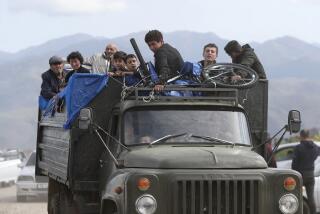Azerbaijanis on Defensive as Fight Intensifies in Karabakh : Caucasus: Fierce resistance to an Armenian advance in the disputed enclave is reported.
- Share via
BAKU, Azerbaijan — Fighting has intensified in the disputed enclave of Nagorno-Karabakh, with Azerbaijani troops back on the defensive despite weeks of attempting to seize the initiative in the 6-year-old war with Armenian forces.
The Interfax news agency reported over the weekend that Azerbaijani troops were “fiercely resisting” an advancing Armenian force in northern Karabakh.
The Azerbaijani Defense Ministry said about 40 Armenians have been killed in the last few days. It did not report the Azerbaijani casualties.
Azerbaijan’s army had begun a large-scale offensive in mid-December after months of putting up little resistance to Armenian advances. The offensive aimed to recover some of the 20% of Azerbaijani territory that Armenian forces then controlled.
Since the beginning of the year, the warfare around Karabakh has escalated.
The Azerbaijanis have made small gains but lost “thousands” of troops in January, according to a senior international aid worker based on the Azerbaijani side of the front line.
The most notable Azerbaijani success in January was the capture of the strategically important Morov Mountains and some villages to the south in the Kelbajar region between Armenia and Karabakh.
But it may have been a costly victory: The operation claimed “more than 100” Azerbaijani lives, said Asad Issazade, an Azerbaijani Defense Ministry spokesman. And the supply lines to the area extend over a 9,000-foot-high mountain pass, a harsh journey in mid-winter.
The Azerbaijanis have also recaptured the railway junction of Horadiz near the Azerbaijani-Iranian border. But the string of Azerbaijani towns outside Karabakh captured by the Armenians last year, including Agdam and Fizuli, remain out of Azerbaijani control.
Some Western diplomats in Baku believe that Azerbaijan’s advance will soon run out of steam.
“The Armenians could then be in a position to inflict an even greater defeat upon the Azeris than they did last year,” one senior European diplomat said.
Asim Mollazade of the opposition Azerbaijan Popular Front said last week that “the Armenians have already gone on the counteroffensive, but (Azerbaijani President Geidar) Aliyev does not want the people to know.”
There is scarce reporting here of the heavy Azerbaijani losses because of strict censorship.
But funerals are increasing. New graves, draped with Azerbaijani flags, appear every day in the Martyrs’ Cemetery outside Parliament in Baku.
In Yevlak, about 50 miles from the front, the men who make and erect tombstones were hard at work last week in the town’s main cemetery. “That one went to the front on Friday and came here on Tuesday,” said one gravedigger, pointing at a new tomb being covered with a layer of concrete.
Azerbaijanis know a high price is being paid. The general feeling here, however, is that the tide has turned and Aliyev’s hard-line policies could win the Karabakh battle.
Aliyev came to power last year after the military overthrow of his unpopular nationalist predecessor, Abulfez Elchibey.
Portraits and photos of Aliyev, the former Azerbaijan Communist Party leader, hang in virtually every shop window and office in Baku.
Aliyev has reportedly hired about 1,000 Afghan moujahedeen mercenaries to stiffen the backbone of the Azerbaijani army. Both sides also use mercenaries from the former Soviet armed forces, and some diaspora Armenians.
More than 15,000 people have been killed in the conflict over Karabakh, which erupted in 1988 after the ethnic Armenian majority there began a campaign for greater autonomy and the Azerbaijani authorities, backed by Soviet troops, tried to stamp it out.
More to Read
Sign up for Essential California
The most important California stories and recommendations in your inbox every morning.
You may occasionally receive promotional content from the Los Angeles Times.













